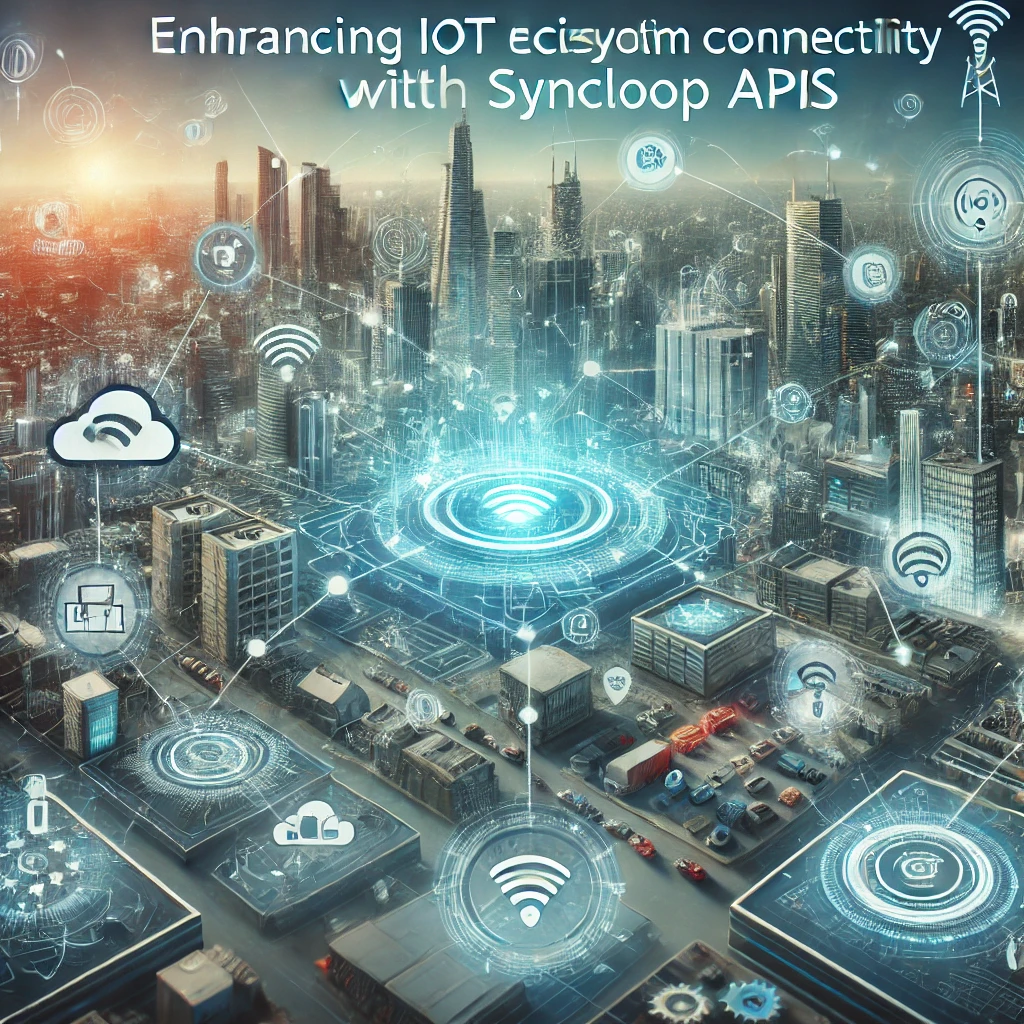Enhancing IoT Ecosystem Connectivity with Syncloop APIs

The Role of APIs in IoT Ecosystems
APIs are the backbone of IoT ecosystems, facilitating:
- Device Communication: Connecting devices to cloud platforms, applications, and other devices.
- Data Integration: Aggregating and processing data from multiple sources for unified analysis.
- Automation: Enabling automated workflows and intelligent decision-making.
- Scalability: Supporting the growing number of connected devices and data streams.
Syncloop simplifies API creation and management for IoT, ensuring efficient and secure connectivity.
Key Features of Syncloop for IoT Ecosystems
1. Dynamic Workflow Automation
Automate IoT data processing workflows with Syncloop’s tools like Ifelse and Await, enabling real-time decision-making.
2. Data Transformation
Transform data formats to ensure compatibility across devices and platforms using Syncloop’s Transformers.
3. Scalable API Gateways
Syncloop’s infrastructure handles high traffic and large data streams, ensuring reliable connectivity in growing IoT ecosystems.
4. Event-Driven Architecture
Trigger workflows based on IoT events, ensuring timely responses to sensor readings, device updates, or system alerts.
5. Real-Time Monitoring
Track IoT API performance, data flow, and error rates with Syncloop’s monitoring dashboard.
6. Secure Data Exchange
Protect IoT communications with token-based authentication, encrypted data transfer, and access control.
Building IoT APIs with Syncloop
Step 1: Define Connectivity Requirements
Identify the devices, protocols, and platforms that need to be connected, along with their specific data and communication needs.
Step 2: Configure API Endpoints
Set up endpoints in Syncloop for key functions, such as:
- Device registration and management.
- Real-time data collection.
- Alerts and notifications.
- Remote device control.
Step 3: Implement Data Transformation
Use Transformers to normalize IoT data formats, aggregate readings, or convert sensor data into actionable insights.
Step 4: Design Automated Workflows
Create workflows to manage IoT processes dynamically. For example:
- Trigger alarms when sensor readings exceed thresholds.
- Automate device updates based on diagnostic data.
- Aggregate and visualize data in real-time dashboards.
Step 5: Enable Real-Time Monitoring
Track API performance and data flow using Syncloop’s monitoring tools to ensure seamless operation.
Step 6: Enhance Security
Implement token-based authentication and encrypted communication to protect sensitive IoT data from unauthorized access.
Real-World Applications
1. Smart Homes
Connect IoT devices like thermostats, lighting, and security systems to provide users with centralized control and automation.
2. Industrial IoT (IIoT)
Enable real-time monitoring and management of factory equipment, reducing downtime and improving productivity.
3. Agriculture
Monitor soil, weather, and crop conditions with IoT sensors, automating irrigation and fertilization for better yields.
4. Healthcare
Facilitate remote patient monitoring with APIs that connect wearable devices, medical equipment, and healthcare platforms.
Best Practices for IoT API Development
- Standardize Data Formats: Use Transformers to ensure data consistency across devices and platforms.
- Optimize for Scalability: Design APIs to handle the increasing number of devices and data streams.
- Secure Communications: Protect sensitive data with encryption and robust authentication.
- Leverage Real-Time Monitoring: Track API performance continuously to detect and resolve issues promptly.
- Implement Error Handling: Use Redo controls and fallback workflows to recover from connectivity disruptions.
Why Choose Syncloop for IoT Connectivity?
Syncloop offers a comprehensive platform for managing IoT APIs, combining advanced automation, real-time monitoring, and robust security features. Its scalable infrastructure ensures seamless connectivity, even in large and complex IoT ecosystems.
Conclusion
Enhancing connectivity in IoT ecosystems requires robust APIs that can manage diverse devices, data formats, and workflows. Syncloop equips developers with the tools to create scalable, secure, and efficient APIs, empowering IoT applications to deliver exceptional performance and reliability. Whether for smart homes, industrial systems, or healthcare, Syncloop ensures your IoT ecosystem is ready for the future.
Back to Blogs